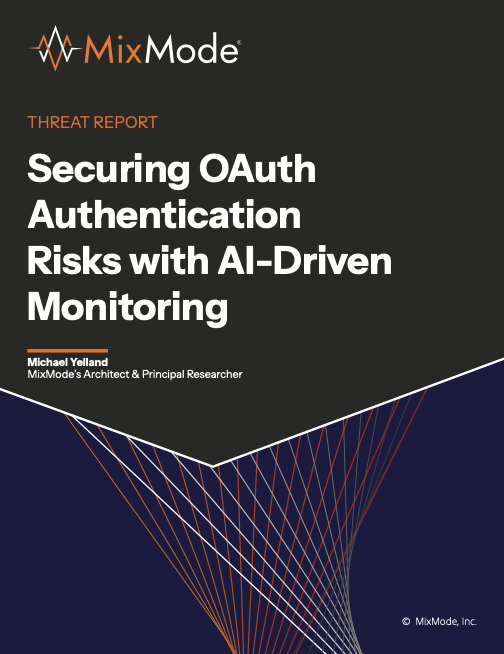Securing OAuth Authentication Risks with AI-Driven Monitoring
As organizations continue to integrate cloud-based services and third-party applications, OAuth authentication has become a cornerstone of modern security frameworks. However, recent cybersecurity incidents highlight a growing concern: OAuth-based vulnerabilities remain an overlooked entry point for attackers, particularly in Zero Trust environments.
OAuth Vulnerabilities Expose Critical Security Gaps

A recent OAuth vulnerability in a widely used travel service exposed millions of airline customers to potential account takeovers. Attackers exploited flaws in OAuth redirection, allowing unauthorized access to user accounts without passwords. This incident underscores a critical issue: many organizations focus on authenticating users but fail to monitor OAuth token activity post-authentication.
For cloud-reliant enterprises, government agencies, and critical infrastructure organizations, this represents a fundamental security risk. OAuth token hijacking can lead to privilege escalation, lateral movement, and long-term unauthorized access—often undetected by traditional security measures.
Why Zero Trust Models Are Falling Short
Despite the promise of Zero Trust security, many implementations fail to account for OAuth threats due to:
- Static Trust Models: OAuth tokens persist across sessions without continuous validation.
- Lack of Delegated Access Controls: Security teams focus on user credentials but overlook token-based authorization pathways.
- Failure to Detect Behavioral Deviations: Traditional tools lack real-time monitoring capabilities to identify OAuth misuse.
AI-Driven Protection Against OAuth-Based Attacks
MixMode addresses these challenges with AI-driven security solutions that provide real-time behavioral analytics, ensuring continuous monitoring beyond initial authentication events. Unlike rule-based security tools, MixMode’s generative AI dynamically learns authentication behaviors and detects anomalies in OAuth token usage.
How MixMode Mitigates OAuth Risks:
- Continuous OAuth Token Monitoring: Identifies suspicious token reuse and unauthorized delegation.
- Real-Time Behavioral Analytics: Detects deviations in authentication sequences without predefined rules.
- Cross-Context Correlation: Integrates OAuth activity with network logs, API transactions, and user analytics.
- Immediate Risk Detection: Flags OAuth abuse, session hijacking, and lateral movement in real time.
Case Study: AI-Driven Security in Action
A leading financial services institution faced challenges in monitoring OAuth authentication across its cloud environment. Traditional security tools struggled with the overwhelming volume of CloudTrail and Flow Log data, resulting in undetected OAuth token abuse. After deploying MixMode, the institution achieved:
- 96% Reduction in False Positives through AI-driven event monitoring.
- Detection of Novel OAuth Attacks across integrated cloud services.
- Real-Time Threat Insights for security teams without manual rule configuration.
- Improved Cloud Monitoring and visibility into authentication anomalies within AWS environments.
The Future of Cloud Security: Continuous OAuth Monitoring
The increasing sophistication of OAuth-based attacks demands a shift from static authentication models to AI-driven, continuous monitoring. Organizations must move beyond traditional security tools and adopt behavioral-based detection to stay ahead of evolving cyber threats.
Don’t leave OAuth security to chance. Download the full MixMode Threat Research report to learn how AI-driven monitoring can protect your organization against OAuth-based attacks.


